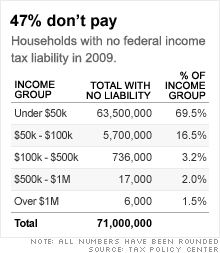We're broke ... time for a new tax
Given the country's fiscal hole, former Fed chair Paul Volcker and many tax experts say there may be a need for a value-added tax.

NEW YORK (CNNMoney.com) -- President Obama has been steadfast in his pledge that he won't raise taxes on those making less than $250,000. But that doesn't mean only high-income households will be subject to higher taxes.
An increasing number of influential Democrats and fiscal-policy experts have signaled that lawmakers will have to get a handle on the deficit. And they recommend seriously considering the creation of a value-added tax (VAT) on top of the federal income tax.
That could mean more money out of everyone's pockets when buying virtually anything -- sweaters, school books, furniture, pottery classes, dinners out.
A VAT is tax on consumption similar to a national sales tax. But it's not just paid at the cash register. It's levied at every stage of production. So all businesses involved in making a product or performing a service would pay a VAT, although they would pass that cost on through higher prices. And then the end-user -- such as the retail customer -- ponies up as well.
No one is suggesting raising taxes or creating new ones before the economy stabilizes.
But Paul Volcker, the former chairman of the Federal Reserve who heads President Obama's tax reform panel, is advocating a little advance planning.
When it comes to getting control of the country's debt burden, "I think if we can't do it on the cost side, we've got to go on the revenue side. And it's too early to do it, but it's not too early to begin wondering," Volcker said Wednesday in an televised interview with PBS' Charlie Rose. "You've got talk about some tax that hits consumption," said Volcker. "Value-added is one."
John Podesta, the head of the liberal think tank Center for American Progress who headed President Obama's transition team, also raised the issue of a VAT this week. He noted that the only way to stabilize the debt situation is to reduce spending, reduce the growth in health care costs and add new revenue.
"As progressives we need to debate the policy merits and likelihood of enacting a range of options -- including designing a small and more progressive value-added tax, changes to the corporate tax code, and taxing-upper income earners beyond reversing the Bush tax cuts," Podesta said in a statement.
Podesta's organization, meanwhile, said in a report, "Responsible people know that additional revenue has to be part of the mix even if they believe in lower taxes in general. And those who believe that government investments and spending are critical to our economic and social well-being ... recognize that tax increases on the wealthiest and corporations are not going to solve the whole problem."
President Obama has proposed closing corporate tax loopholes and increasing the tax bite on upper-income households by letting most of the 2001 and 2003 tax cuts expire for families making more than $250,000.
He has also proposed making those cuts permanent for everyone else -- which would cost federal coffers roughly $2 trillion in foregone tax revenue over 10 years.
Just how hard would it be to lean only on the top 5% of taxpayers to pay for everything the country has to do in the next 10 years?
"You'd have to hit them hard, raising their top marginal rates by as much as 30 percentage points," said Roberton Williams, a senior fellow at the non-partisan Tax Policy Center. In other words, instead of a top income tax rate of 39.6%, it would have to kiss up to 70%.
Rather than such draconian measures, experts say the most effective way to attack annual deficits is through a combination of spending cuts and tax hikes.
In theory, having a VAT might let lawmakers lower personal and corporate income tax rates.
But if the rate of the VAT is set relatively low -- say at 5% -- and if the rate of government spending continues apace, that might not raise enough revenue to make lower income tax rates a possibility, said Rudolph Penner, a former director of the Congressional Budget Office and now an institute fellow at the Urban Institute, a public policy research group.
"If we vigorously control spending growth or are willing to tolerate a significant, although lower deficit, there would be something left over for tax cuts," Penner said.
Currently, the notion of a VAT is "a non-starter from a political perspective," said William Gale, co-director of the Tax Policy Center, at a Center for American Progress conference this week.
Democrats say it's regressive, meaning it would hit lower-income people hardest since they tend to spend all of their income on consumption purchases that could be subject to the VAT. Low-tax advocates, such as conservative Republicans, see a VAT -- on top of the current tax system -- as harmful.
But given the depth of the nation's fiscal needs, there aren't many attractive options.
"Tax rates could be raised in the existing system, but that would be extremely inefficient," said Penner in a paper about the VAT. "Tax reform might raise revenues more efficiently, but that is excruciatingly difficult politically."
"That leaves the possibility of a brand new tax, and a VAT is a very likely candidate," he added. ![]()

